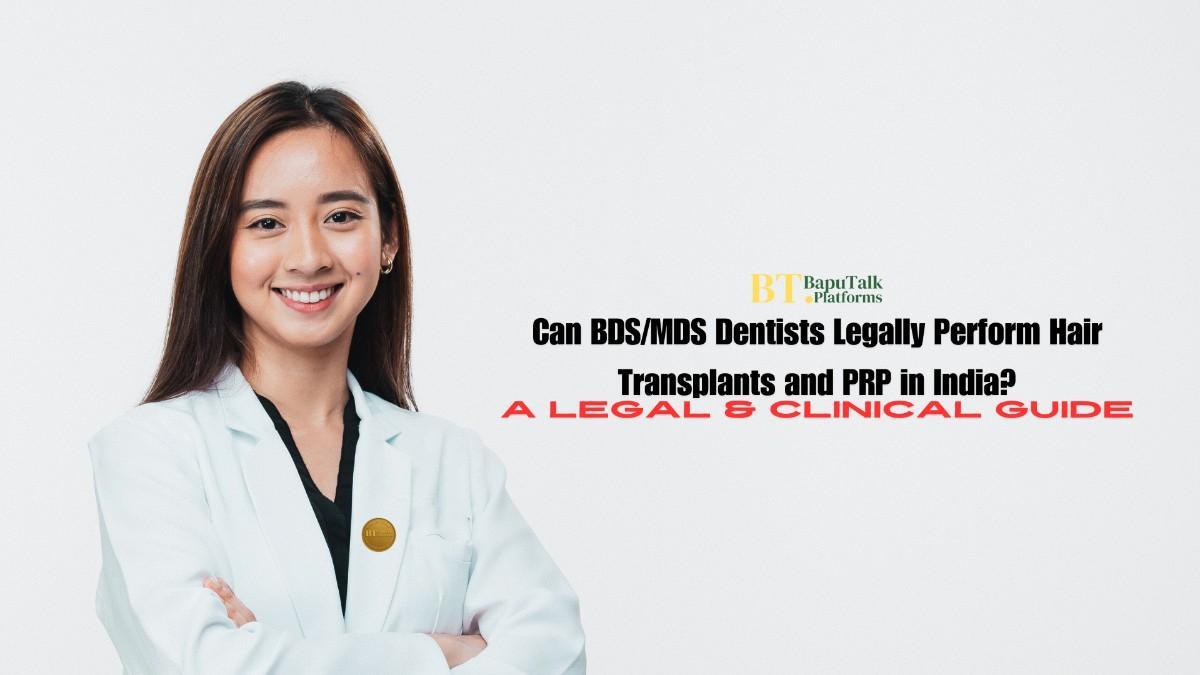Can BDS/MDS Dentists Legally Perform Hair Transplants and PRP in India? A 2025 Legal & Clinical Guide
by Team BapuTalk, 4 months ago

With the rising popularity of aesthetic procedures like hair transplants and Platelet-Rich Plasma (PRP) therapy, many dental professionals in India are exploring opportunities in this field. However, the legal and ethical boundaries surrounding these practices are complex. This article provides a comprehensive overview of what BDS and MDS-qualified dentists are legally permitted to perform in India as of 2025, focusing on hair transplants and PRP treatments.
Legal Framework for Dentists Performing Hair Transplants Dental Council of India (DCI) Guidelines
In December 2022, the Dental Council of India (DCI) issued guidelines permitting Oral and Maxillofacial Surgeons (OMFS) to perform aesthetic procedures, including hair transplants, provided they have undergone adequate training as per the curriculum. These guidelines emphasize the necessity for proper facilities, emergency equipment, and thorough patient evaluation and documentation .
Scope for General Dentists (BDS Holders)
The DCI guidelines specifically apply to OMFS specialists and do not extend to general BDS practitioners. Therefore, BDS-qualified dentists without an MDS in Oral and Maxillofacial Surgery are not authorized to perform hair transplant surgeries.
Legal Challenges and Ongoing Debates
The inclusion of OMFS in performing hair transplants has faced legal scrutiny. A Public Interest Litigation (PIL) filed in the Bombay High Court by the Dynamic Dermatologist and Hair Transplant Association challenges the DCI's guidelines, arguing that OMFS lack the requisite training for such procedures . The court has sought clarifications, and the matter remains under judicial consideration .
PRP Therapy: Legal Considerations
PRP therapy involves injecting platelet-rich plasma into the scalp to stimulate hair growth. While less invasive than hair transplants, PRP is still a medical procedure requiring proper training and adherence to medical protocols.
Eligibility for Dentists
There is no explicit guideline from the DCI regarding PRP therapy. However, since PRP involves blood handling and injections, it typically falls under the purview of medical professionals with appropriate training. Dentists considering offering PRP treatments should seek specialized training and consult with their respective State Dental Councils to ensure compliance with local regulations.
Risks of Unqualified Practice
Engaging in hair transplant or PRP procedures without proper qualifications can lead to severe consequences:
-
Patient Safety Risks: Unqualified practitioners may lack the skills to handle complications, leading to adverse outcomes .
-
Legal Repercussions: Practicing beyond one's scope can result in legal action, including charges of medical negligence .
-
Professional Sanctions: Dentists may face disciplinary actions from regulatory bodies, including suspension or revocation of their license.
Best Practices for Interested Dental Professionals
-
Pursue Specialized Training: Dentists should enroll in accredited courses focusing on aesthetic procedures to gain the necessary skills.
-
Consult Regulatory Bodies: Before offering new services, consult with the DCI and State Dental Councils to ensure compliance with current regulations.
-
Collaborate with Medical Professionals: Working alongside qualified dermatologists or plastic surgeons can provide valuable experience and ensure patient safety.
Conclusion
While opportunities in aesthetic dentistry are expanding, it's crucial for dental professionals to operate within the legal and ethical boundaries set by regulatory authorities. As of 2025, only MDS-qualified Oral and Maxillofacial Surgeons with appropriate training are authorized to perform hair transplants in India. Dentists interested in offering PRP therapy should seek specialized training and consult with regulatory bodies to ensure compliance.